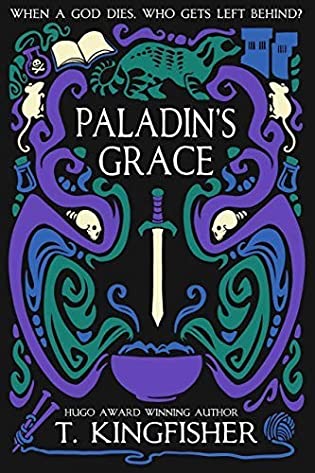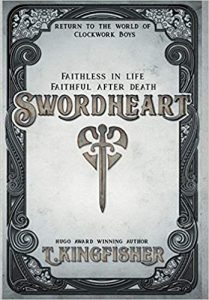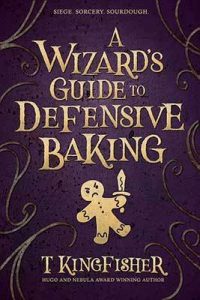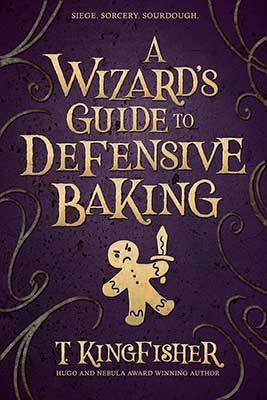 Paladin's Grace by T. Kingfisher
Paladin's Grace by T. Kingfisher Format: ebook
Source: purchased from Amazon
Formats available: hardcover, ebook
Genres: epic fantasy, fantasy, fantasy romance
Series: Saint of Steel #1
Pages: 398
Published by Red Wombat Studio on February 11, 2020
Purchasing Info: Author's Website, Publisher's Website, Amazon, Barnes & Noble, Kobo, Bookshop.org
Goodreads
Stephen’s god died on the longest day of the year…
Three years later, Stephen is a broken paladin, living only for the chance to be useful before he dies. But all that changes when he encounters a fugitive named Grace in an alley and witnesses an assassination attempt gone wrong. Now the pair must navigate a web of treachery, beset on all sides by spies and poisoners, while a cryptic killer stalks one step behind…
From the Hugo and Nebula Award winning author of Swordheart and The Twisted Ones comes a saga of murder, magic, and love on the far side of despair.
My Review:
The title is a pun. It’s also a clue to the way this story works itself out. Which is bloody damn marvelous every slightly meandering step of the way.
There’s a question about whether Paladin’s Grace is an epic fantasy that includes a romance, or a fantasy romance that happens to also be epic. After mulling it over for a while, I’m pretty sure the answer is “yes!” Or perhaps “hells to the yes!” is a bit more accurate.
 The setting of this story is plenty epic. It’s also set in the same world as her Clocktaur War duology and Swordheart but certainly doesn’t rely on any of them to get the reader stuck right into it. I haven’t read either and had no trouble becoming immediately involved, understanding what was going on, or being so damn absorbed I couldn’t put it down.
The setting of this story is plenty epic. It’s also set in the same world as her Clocktaur War duology and Swordheart but certainly doesn’t rely on any of them to get the reader stuck right into it. I haven’t read either and had no trouble becoming immediately involved, understanding what was going on, or being so damn absorbed I couldn’t put it down.
Not that I didn’t buy all three books as soon as I finished and realized that there were three other books set in this world. Because DAMN! this was good.
The setting dragged me in right away because it leads off with a fascinating concept that powers so much of the story in various ways. This is a world where the gods are real. By that I mean the gods act in and on the world and their worshippers in ways that can be witnessed, not just by believers but by everyone.
In that sense, it’s a world that resembles the world of Max Gladstone’s Craft Sequence, starting with Three Parts Dead. That’s a world where the lawyers are necromancers, and part of their job is to write contracts for gods both living and dead. But even more than the Craft Sequence, the world of Paladin’s Grace reminds me of Lois McMaster Bujold’s World of the Five Gods, particularly as it is seen through the eyes of the Learned Divine Penric of the White God and his demon Desdemona in Penric’s Demon and the books that follow. Penric has met his god, usually just before or just after said god sends him on yet another errand, and other people in that world have met their gods as well.
The way that the Saint of Penric’s order interacts with their god and the way that the Paladins of the Saint of Steel interact with theirs has some similarities – right up until the paladins’ god dies, leaving all of its paladins reeling as though someone has scooped out their hearts, souls and all the rest of their innards both physical and metaphorical.
The thing about the Saint of Steel is that this god blessed their paladins with divine berserker fits. So when the god dies they all go literally berserk, into a killing rage that results in murders, suicides, explosions and generally a whole lot of the death they were famous for in the first place.
Three years later there are only seven paladins of the Saint of Steel left, barely keeping each other alive and functional, assisted by those who serve the Rat God, an order which has no paladins of its own. But it does have lawyers, leading back to that resemblance to the Craft Sequence I mentioned earlier.
Serving the Rat and protecting its Bishop, the absolutely awesome Bishop Beartongue, gives the remaining paladins enough purpose to keep them going. It’s all any of them expect out of life at this point. (And if the author ever writes an entire book featuring the Bishop, I am SO there!)
Then Paladin Stephen becomes entangled with Grace the perfumer, and he discovers a whole new reason for living. If he can let himself. If he can get over himself. If he can trust himself.
If the Bishop and his brother paladins can manage to extract them both from the political clusterfuck that they’ve bumbled into – in spite of the odds against them all along the way.
Escape Rating A+: Paladin’s Grace was definitely, sincerely, absolutely a case of the right book at the right time.
There is just so much happening in this story, both on the epic fantasy and the fantasy romance sides of the equation. Plus – big huge gigantic plus – the author’s very dry and frequently hung from the gallows humor made me laugh out loud so many times, even as it both developed the characters and pushed the story forward. This is my favorite type of humor, the kind that arises out of character and situation and is never built on cruelty, tearing up or punching down.
I wanted to go out for drinks with pretty much everyone on Stephen and Grace’s side of the story, including them. Even when their world was going to hell in a handcart, the way the author wrote them created plenty of opportunities to laugh with them and not at them.
On the romance side, Stephen in particular is the poster child for the romantic hero who is so fucked up and has so much baggage that he’s certain he couldn’t possibly be good enough for the heroine. Not that Grace doesn’t have plenty of her own baggage, but in comparison, hers is almost normal. Stephen has lost his god and is rightfully afraid of going berserker at any moment. Nothing compares.
The political situation that they stumble into is, on the one hand, fairly standard for epic fantasy, and on the other, wildly different because it is so totally inept and still almost works. There is just a ton about this story to love.
As I said early on, this was the right book at the absolute right time. I was ready to start a new book just as the polls closed in Georgia this week. It was a night that promised to be chock-full of doomscrolling, so I went looking for a book that would suck me in so deeply that I’d be able to forget about the mess for a few hours. (I voted by mail weeks ago, so there wasn’t much I could do at that point except incessantly doomscroll hoping it would eventually turn to schadenscrolling and even gleescrolling at some point.) But constant scrolling is not productive, only anxiety inducing. Nobody needed any more of THAT this week – not that we didn’t all get plenty ANYWAY.).
 That’s the point where I remembered I had Paladin’s Grace, and that I absolutely LOVED this author’s Wizard’s Guide to Defensive Baking which made me chuckle, laugh and outright chortle the entire time I was reading it.
That’s the point where I remembered I had Paladin’s Grace, and that I absolutely LOVED this author’s Wizard’s Guide to Defensive Baking which made me chuckle, laugh and outright chortle the entire time I was reading it.
Considering the news on Wednesday, I really, really needed the distraction.
Paladin’s Grace turned out to be EXACTLY the book I was looking for. It didn’t reduce me to completely incoherence, as the paladin Stephen and the perfumer Grace frequently do to each other in the course of this story. But it did take me far, far away from the madness of the real for a while. For which I am so, so grateful.

 A Wizard’s Guide to Defensive Baking by
A Wizard’s Guide to Defensive Baking by